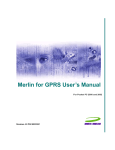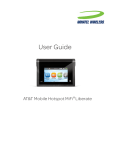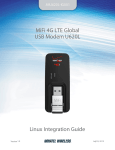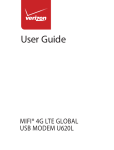Download Merlin GPRS Generic.book
Transcript
Merlin for GPRS User’s Manual
For: Windows 98, 98SE, 2000, ME, and XP
Revision 2
Notice: Restricted Proprietary Information
© Copyright Novatel Wireless Technologies Ltd. (2001-2002)
The information contained in this document is the exclusive property of Novatel Wireless Technologies Ltd. All rights
reserved. Unauthorized reproduction of this manual in any form without the expressed written approval of Novatel Wireless
Technologies Ltd is strictly prohibited. This manual may not, in whole or in part, be copied, reproduced, translated, or
reduced to any electronic or magnetic storage medium without the written consent of a duly authorized officer of Novatel
Wireless Technologies Ltd.
The information contained in this document is subject to change without notice and should not be construed as a
commitment by Novatel Wireless Technologies Ltd. unless such commitment is expressly given in a covering document.
Novatel Wireless Technologies Ltd makes no warranties, either expressed or implied, regarding this document, its
merchantability, or its fitness, for any particular purpose.
Microsoft®, Windows®, Microsoft® Pocket Internet Explorer, Microsoft® Pocket Outlook, and Microsoft® ActiveSync® are
either registered trademarks or trademarks of Microsoft Corporation in the United States and/or other countries. All other
brand names and product names used in this document are trade names, service marks, trademarks, or registered
trademarks of their respective owners.
Printed and produced in Canada.
Table of Contents
The PC Card ...............................................................................................................1
The SIM Card Slot ......................................................................................................2
The Antenna ...............................................................................................................2
Using the SIM Card ....................................................................................................2
Inserting the SIM Card................................................................................................3
Removing the SIM Card .............................................................................................3
Inserting the Modem into Your Computer ...................................................................4
Removing the Modem from Your Computer ...............................................................4
Installing the Modem Software ..............................................5
Configuring the Modem ..........................................................9
Single Pre-defined Connection Profile ........................................................................9
Multiple Pre-defined Connection Profiles..................................................................10
User Defined Connection Profile ..............................................................................10
Creating a GPRS Connection Profile........................................................................11
Creating a GSM Connection Profile..........................................................................14
Using the Modem Manager ..................................................17
Launching the Modem Manager......................................................................................17
Entering Your Account PIN .............................................................................................18
Entering a PUK................................................................................................................20
Connecting to the Network ..............................................................................................21
Using Multiple Connection Profiles..................................................................................22
Disconnecting from the Network .....................................................................................23
Quitting the Modem Manager..........................................................................................24
Creating a New Connection Profile .................................................................................24
Editing a Connection Profile ............................................................................................25
Deleting a Connection Profile..........................................................................................26
Setting a Connection Profile as Default...........................................................................27
Viewing a Connection Profile’s Properties ......................................................................27
Using the Automatic Network Search Feature28
Using the Manual Network Search Feature28
Viewing the Network Connection History29
Keeping the Modem Manager Always Visible30
Merlin for GPRS
Getting Started ........................................................................1
2
Table of Contents
Hiding the Modem Manager Window..........................................................................................................30
Collapsing or Expanding the Modem Manager...........................................................................................31
Viewing New Text (SMS) Messages ..........................................................................................................32
Accessing the Modem Manager Online Help .............................................................................................32
Accessing Novatel Wireless Web Support ................................................................................ 33
Modem Manager Reference .....................................................................35
Modem Manager Main Window ..................................................................................................................35
System Tray Icons ......................................................................................................................................36
Connection Manager Window.....................................................................................................................37
Detailed Status Report Window..................................................................................................................37
Modem Properties Window.........................................................................................................................39
About GPRS Modem Manager Window .....................................................................................................40
GPRS Connection Profile Properties Window ............................................................................................41
GSM Connection Profile Properties Window ..............................................................................................43
The Options Window ..................................................................................................................................44
The Add Connection Wizard.......................................................................................................................44
Glossary ....................................................................................................45
Technical Support ....................................................................................49
Manual Revision 2
Getting Started
This chapter describes the various components of the Merlin for GPRS G201 PC
Card modem.
Merlin for GPRS Modem Components
•
The antenna,
•
The PC Card, and
•
The SIM card slot.
Figure 1 shows a top view of the modem and indicates the location of the general
components.
SIM Card
Slot
Antenna
Modem Face
PC Card
Figure 1 Modem Components
The PC Card
The PC Card, shown in Figure 1, contains the modem’s circuitry. When this card
is inserted into your computer’s PC Card slot, the portion of the card containing
the SIM card slot and the antenna will remain outside the slot. To prevent
damage, you should always remove the modem from the PC Card slot whenever
you move your computer.
Merlin for GPRS
The Merlin for GPRS modem has three general components:
2
Getting Started
The SIM Card Slot
You must insert your SIM card into the SIM card slot, shown in Figure 1, in order for your modem
to access your GPRS or GSM network account information and connect to the network. See
“Using the SIM card” on page 2 for more information.
The Antenna
The Merlin for GPRS modem’s antenna can be rotated in many directions to receive the best
signal reception.Rotate the antenna up and out of the way when you insert the modem into your
computer’s PC Card slot. Fold the antenna against the back of the modem for storage, as shown
in Figure 2, once you have removed it from your computer.
Figure 2 Storing the Antenna
Using the SIM Card
In order to use your Merlin for GPRS modem, you must have a GSM/GPRS network account. Your
network account information is stored on the SIM card, shown in Figure 3.
Orientation
Notch
SIM Card
Contact Point
Figure 3 SIM Card
The SIM (Subscriber Identity Module) card contains a small amount of memory and a processor
to assist in the management of your account information.
Manual Revision 2
Getting Started
3
The SIM card uses contact points to connect with the modem. You must take care not to damage
the contact point.
The orientation notch is used as a reference for properly inserting the SIM card into the modem.
Inserting the SIM card incorrectly will prevent the modem from communicating with the network.
Inserting the SIM Card
The SIM card is inserted into the SIM Card Slot, as shown in Figure 4.
Figure 4 Inserting the SIM Card
Verify that the SIM card contact point is facing upward and that the orientation notch is located
to the left of the modem. An illustration of this procedure is stamped on the bottom of the modem.
See Figure 5.
Removing the SIM Card
Remove the SIM card using the SIM Card Removal Slot, located on the bottom of the modem,
shown in Figure 5.
SIM Card
Removal Slot
SIM Orientation
Illustration
Figure 5 Removing the SIM Card
Manual Revision 2
4
Getting Started
To remove your SIM card, insert a pointed device, such as the tip of a stylus, in the SIM Card
Removal Slot, and gently move the SIM card to the left and out of the slot.
Note:
Make certain you use a blunt, thin, plastic object to remove the SIM card. Do not use
a sharp object as you could damage the modem’s circuitry. Do not use a pencil, as pencil
leads can break off in the SIM Card Removal Slot and damage the modem.
Inserting the Modem into Your Computer
To insert your Merlin for GPRS modem, locate the PC Card slot on your computer, rotate the
antenna into the upright position, verify that the modem is face up, and insert the front end of the
modem into the PC Card slot (the end opposite of the SIM card slot).
Note:
The PC Card slots must be able to accept Type II PC Cards.
Removing the Modem from Your Computer
To remove the Merlin for GPRS modem, first click the PC Card tray icon
(located in the
bottom-right corner of your desktop) to stop the modem. A message will appear instructing you
that it is now safe to remove your modem. Press the PC Card slot eject button and remove the
modem from the PC Card slot.
Manual Revision 2
Installing the
Modem Software
Before you can use your Merlin for GPRS PC Card modem, you must first install
the GPRS Modem Manager software onto your computer. This chapter will guide
you through the installation procedure.
Do not insert the modem into your computer until the software installation is
complete.
To install the Modem Manager:
1.
Insert the Installation CD into the CD drive of your computer. The Installation
program will automatically launch, and display the Welcome window, shown
in Figure 6.
Figure 6 Welcome window
Merlin for GPRS
Note:
6
2.
Installing the Modem Software
Read the contents of the window and click Next to continue. The License Agreement
window will be displayed, shown in Figure 7.
Figure 7 License Agreement window
3.
Read the License Agreement and click I have read and agree to the above terms if you
are satisfied with the conditions of the agreement.
4.
Click Next to continue. The Destination Folder window will be displayed, as shown in
Figure 8.
Figure 8 Destination Folder
Manual Revision 2
Installing the Modem Software
7
5.
Select the desired folder for the Modem Manager software installation. Most users will select
the default directory. If you would like a shortcut to the GPRS Modem Manager placed on
your desktop, select Place a shortcut on the desktop.
6.
Click Next to continue. The Installing window will be displayed, shown in Figure 9. The
Modem Manager program will be installed in the folder indicated previously.
Figure 9 Installing window
Once the Modem Manager has been successfully installed, the Installation Complete
window will be displayed, shown in Figure 10.
Figure 10 Installation Complete window
Manual Revision 2
8
7.
Installing the Modem Software
Click Finish to exit the installation program.
Note:
8.
Depending on the operating system you are using, you may be prompted to restart your computer in order to complete the installation procedure. Click Yes to restart your computer
immediately. Once your computer has restarted, continue to Step 8.
Insert the Merlin for GPRS modem into your computer’s PC Card slot. Windows will display
the Found New Hardware window, shown in Figure 11.
Figure 11 Found New Hardware window
Windows will install the necessary drivers in order for your Merlin for GPRS modem to connect
to the network.
Use the Modem Manager software to configure and control your modem. To access the Modem
Manager software, double-click the Modem Manager desktop icon (if you requested the shortcut
be placed on your desktop), or select Start -> Programs -> Novatel Wireless -> Merlin GPRS
-> GPRS Modem Manager.
Manual Revision 2
Configuring the
Modem
Depending on the configuration of your software and your service provider, you
will be required to complete one of the configuration paths listed below. The
appropriate configuration process will be launched automatically. You will not
need to choose the configuration path.
The configuration paths are:
• Single pre-defined connection profile,
• Multiple pre-defined connection profile, and
• User defined connection profile.
Note:
The modem must be inserted in the PC Card slot during the configuration
process. See Inserting the Modem Into Your Computer on page 4 for
more information.
Single Pre-defined Connection Profile
If your service provider has configured their network so that all clients will use a
single point of access, a network connection profile will have been previously
installed. In this instance, once you install the Modem Manager software and
reboot your computer, no other configuration is necessary. When the Modem
Manager is launched, it will use the pre-defined connection profile to connect to
the network when directed (provided you have a GSM or GPRS account with the
designated service provider).
Merlin for GPRS
Your Merlin for GPRS G201 PC Card modem may have come preconfigured with
one or more connection profiles. A connection profile contains the necessary
information to identify your modem to your service provider and access your
GPRS or GSM account.
10
Configuring the Modem
Multiple Pre-defined Connection Profiles
If your service provider has configured their network to allow clients network access through one
of several pre-defined connection profiles, once the Modem Manager is launched, you will be
required to select the desired profile (as indicated by your service provider) from the Connection
Selection window in order to connect to the network. See Figure 12.
Figure 12 Connection Selection window
Highlight the specified connection profile and click Connect.
User Defined Connection Profile
In order to register and connect to your service provider’s GPRS or GSM network, you must first
create a network connection profile.
Once you have completed the installation procedure, launch the Modem Manager by doubleclicking on the desktop icon (if you requested an icon be placed on your desktop), shown in
Figure 13.
Figure 13 Modem Manager Icon
Alternately, you can launch the Modem Manager by selecting Start -> Programs -> Novatel
Wireless -> Merlin GPRS -> GPRS Modem Manager.
Manual Revision 2
Configuring the Modem
11
When the Modem Manager application is initially launched, the Setup dialog box will open,
shown in Figure 14.
Figure 14 Setup dialog box
You must create a connection profile before you can connect to the Internet. If you choose to
create the connection profile now (click Create Connection Now), the Add Connection Wizard
will launch in order to guide you through this procedure. If you choose to delay creating a
connection profile, you must access the Add Connection Wizard through the Connection
Manager window. The Add Connection Wizard allows you to create either a GSM or GPRS
network connection profile. Your service provider will indicate which network type to use when
creating the connection profile.
If your service provider uses a GPRS network type, see the section below. If your service provider
uses a GSM network type, see Creating a GSM Connection Profile on page 14.
Creating a GPRS Connection Profile
To create a GPRS connection profile:
1.
Select Connection Manager from the Tools menu. The Connection Manager window will
be displayed, shown in Figure 15.
Note:
If you chose Create Connection Now from the Setup window, shown in Figure 14, the Add
Connection Wizard will automatically launch (you will not see the Connection Manager window).
Figure 15 Connection Manager window
Manual Revision 2
12
2.
Configuring the Modem
Click Add. The Add Connection Wizard will launch, and display the Connection Name
dialog box, shown in Figure 16.
Figure 16 Connection Name dialog box
3.
Type the name of your connection profile in the Connection Name text field (any name of
your choice).
4.
Click Next to continue. The Connection Type dialog box will be displayed, shown in Figure
17.
Figure 17 Connection Type dialog box
5.
Select the GPRS radio button (as indicated by your service provider).
6.
Click Next to continue. The GPRS Protocol dialog box will be displayed, shown in Figure
18.
Figure 18 GPRS Protocol dialog box
Manual Revision 2
Configuring the Modem
13
7.
Type the APN (Access Point Name), obtained from your service provider, into the APN field.
8.
Enter the Primary and Secondary DNS addresses (obtained from your service provider)
into the appropriate fields, or if you have been instructed by your service provider to have
the Modem Manager automatically search for the DNS addresses, select the Obtain DNS
server addresses automatically check box.
9.
Click Next to continue. The Enter User Information dialog box will be displayed, shown
Figure 19.
Figure 19 Enter User Information dialog box
10. If your service provider requires you to enter a user name and password, select A user
name and password are required by my carrier, and enter the user information (obtained
from your service provider) into the appropriate fields.
If your service provider does not require a user name or password, leave all fields empty.
11. Click Next to continue. The Default Connection dialog box will be displayed, shown in
Figure 20.
Figure 20 Default Connection dialog box
12. Select Yes to make the new network connection profile your default connection, or No to
keep the existing default connection profile settings.
13. Click Finish to add the new network connection profile to the Connection Profile list pane.
Manual Revision 2
14
Configuring the Modem
Creating a GSM Connection Profile
To create a GSM connection profile:
1.
Select Connection Manager from the Tools menu. The Connection Manager window will
be displayed, shown in Figure 21.
Note:
If you chose Create Connection Now from the Setup window, shown in Figure 14, the Add
Connection Wizard will automatically launch (you will not see the Connection Manager window).
Figure 21 Connection Manager window
2.
Click Add. The Add Connection Wizard will launch, and display the Connection Name
dialog box, shown in Figure 22.
Figure 22 Connection Name dialog box
3.
Type the name of your connection profile in the Connection Name text field (any name of
your choice).
Manual Revision 2
Configuring the Modem
4.
15
Click Next to continue. The Connection Type dialog box will be displayed, shown in Figure
23.
Figure 23 Connection Type dialog box
5.
Select GSM-Data radio button (as indicated by your service provider).
6.
Click Next to continue. The GSM Protocol dialog box will be displayed, as shown in Figure
24.
Figure 24 GSM Protocol dialog box
7.
Type your User Name, Password, and Phone Number (these items are obtained from your
service provider) into the appropriate fields.
Manual Revision 2
16
8.
Configuring the Modem
Click Next to continue. The Default Connection dialog box will be displayed, shown in
Figure 25.
Figure 25 Default Connection dialog box
9.
Select Yes to make the new network connection profile your default connection, or No to
leave the existing default connection profile settings.
10. Click Finish to add the new network connection profile to the Connection Profile list pane.
Manual Revision 2
Using the Modem
Manager
The GPRS Modem Manager software allows you to configure and control your
Merlin for GPRS modem. The following sections will instruct you on using the
Modem Manager and its various features.
Launching the Modem Manager
11. Verify that the SIM card is properly inserted into your Merlin for GPRS G201
modem, and insert the modem into your computer’s PC Card slot. See
Getting Started on page 1 for further instruction on this procedure.
12. Launch the Modem Manager application by double-clicking the Modem
Manager icon (if you requested an icon be placed on your desktop, or by
selecting Start -> Programs -> Novatel Wireless -> Merlin GPRS -> GPRS
Modem Manager.
The Modem Manager main window will open, shown in Figure 26, and
attempt to initalize and connect with the Merlin for GPRS modem through the
PC Card port.
Figure 26 Modem Manager window
If your service provider requires you to enter a PIN (Personal Identification
Number) before the Modem Manager can register and connect to your
modem, see Entering Your Account PIN on page 18 for more information.
Merlin for GPRS
To launch the Modem Manager:
18
Using the Modem Manager
Once the Modem Manager has successfully connected to the Merlin for GPRS modem, the
application will attempt to register the modem to the GPRS/GSM network as indicated by
your default connection profile.
Note:
If the Modem Manager is unable to connect to your Merlin for GPRS modem, verify that both
the SIM card and your modem are properly installed. The Current Status field will indicate if
the SIM card or modem are missing.
When the modem has successfully registered to the network, the Current Status field will
display Ready to connect, home network and the Carrier field will display the name of
your service provider, shown in Figure 27.
Figure 27 Successful Registration
Entering Your Account PIN
If your service provider requires you to enter a PIN (Personal Identification Number) before you
can use your network account, the Modem Manager will display the Enter PIN dialog box, shown
in Figure 28, before registering to the network.
Figure 28 Enter PIN dialog box
Manual Revision 2
Using the Modem Manager
19
Type your PIN, obtained from your service provider, into the text field and click OK. If you have
entered the correct PIN, the PIN Disabled dialog box will be displayed, shown in Figure 29.
Figure 29 PIN Disabled dialog box
This dialog box verifies that your account PIN has been accepted and has now been disabled.
Click OK to close this window.
If you have entered an incorrect PIN, an error message will be displayed. Click OK to close the
error message, verify you have the correct PIN and carefully reenter it in the Enter PIN dialog
box.
If you enter a PIN three times incorrectly, your SIM card will be blocked, shown in Figure 30, and
you must obtain a PUK (PIN Unblocking Key) from your service provider. See Entering a PUK
on page 20 for more information.
Figure 30 Error message
If you have forgotten your PIN, click Forgot PIN... from the Enter PIN dialog box, and contact
your service provider to obtain a PUK (PIN Unblocking Key). See Entering a PUK on page 20
for more information.
Manual Revision 2
20
Using the Modem Manager
Entering a PUK
If you have forgotten your PIN or have entered an incorrect PIN three or more times, you are
required to enter a PUK (PIN Unblocking Key), in order to unblock your SIM card. See Figure 31.
Figure 31 Enter PUK and PIN dialog box
Your service provider will give you the PUK and a new PIN. Carefully enter these values into their
respective fields, and click OK to save the values. Once the values have been accepted, the SIM
card will no longer be blocked and the PIN will be changed. The Modem Manager will now be
able to access your network account information.
Note:
If you enter a PUK incorrectly three times, the SIM card will again be blocked. You must contact your service provider to obtain a new PUK and PIN.
Manual Revision 2
Using the Modem Manager
21
Connecting to the Network
Note:
The Modem Manager must have access to a connection profile in order to connect to the
network. If you have not been provided with a pre-defined connection profile, or have not
created one previously, see Creating a New Connection Profile on page 24 for more information.
To connect to the network, open the Modem Manager main window, and click Connect. The
modem will then attempt to register and connect to the network using the information provided in
the default connection profile. See Figure 32.
Figure 32 Connect button
Once the Modem Manager has successfully registered and connected to the network, the
Current Status field will display the message Connected.
If you have not specified a connection profile as your default setting, the Modem Manager
requires you to select the desired profile from the Connection Selection window, shown in
Figure 33.
Figure 33 Connection Selection window
For more information on connecting to the network using an alternate connection profile, see
Using Multiple Connection Profiles on page 22.
Manual Revision 2
22
Using the Modem Manager
You may also direct your modem to automatically connect to the network when the Modem
Manager is launched by selecting Options from the Tools menu, and selecting the
Automatically connect when GPRS Modem Manager is launched check box (the option is
selected by default), shown in Figure 34.
Figure 34 Autoconnect check box
Using Multiple Connection Profiles
To use an alternate connection profile (without changing your default settings) to connect to the
network, select Connect from the Modem menu. The Connection Selection window will appear,
shown in Figure 35.
Figure 35 Connection Selection window
Highlight the desired profile and click Connect. The Modem Manager will attempt to use the
specified connection profile to connect to the network.
Manual Revision 2
Using the Modem Manager
23
Disconnecting from the Network
To disconnect from the network, close all Internet applications, such as e-mail and web browsers,
and from the Modem Manager main window, click Disconnect. See Figure 36.
Figure 36 Disconnect button
Alternately, you can select Disconnect from the Modem menu, shown in Figure 37.
Figure 37 Disconnect command
To disconnect from the network, and close the Modem Manager application, click the
in the top-right corner of the Modem Manager main window.
, located
Manual Revision 2
24
Using the Modem Manager
Quitting the Modem Manager
To quit the Modem Manager application, click the
Modem Manager main window.
, located in the top-right corner of the
Alternately, you can select Exit from the Modem menu, as shown in Figure 38.
Figure 38 Exit command
The modem will terminate its network connection, and the Modem Manager will shut down.
Creating a New Connection Profile
If you have arranged to have more than one network account, you need to create a new
connection profile. Your service provider will provide you with all of the necessary information
such as, APN (Access Point Name), DNS addresses, Connection type, and a user name and
password, if necessary. Once you have obtained the necessary information, you can begin
creating a new connection profile.
If your service provider uses a GPRS network, please see Creating a GPRS Connection Profile
on page 11 for further instructions. If your service provider uses a GSM network, please see
Creating a GSM Connection Profile on page 14.
Manual Revision 2
Using the Modem Manager
25
Editing a Connection Profile
Note:
Do not change your connection profile properties unless requested to do so by your service
provider. Changing your network information without consulting your service provider may
disable your modem’s ability to register and connect with the network.
To edit a connection profile:
1.
Select Connection Manager from the Tools menu. The Connection Manager window will
be displayed, shown in Figure 39.
Figure 39 Connection Manager window
2.
Highlight the connection profile you wish to edit from the Connection Profile list pane.
3.
Click Properties. The GPRS or GSM Properties window will be displayed, depending on
the network type of the connection profile.
GSM-Data Properties Window
GPRS Properties Window
4.
Move to the desired fields and edit the values (use the tabs in the GPRS Properties window
to navigate to the desired fields).
5.
Click OK to save the changes and close the Properties window.
Manual Revision 2
26
Using the Modem Manager
Deleting a Connection Profile
Note:
When you delete a connection profile, all network account information is erased. Your
modem will be unable to connect to the specified network without access to this information.
Delete a connection profile only if the specified network account is no longer valid, or if the
information contained in the connection profile is incorrect.
To delete a connection profile:
1.
Select Connection Manager from the Tools menu. The Connection Manager window will
be displayed, shown in Figure 40.
Figure 40 Connection Manager window
2.
Highlight the desired profile from the Connection Profile list pane.
3.
Click Delete. The Delete Connection dialog box will appear, shown in Figure 41.
Figure 41 Delete Connection dialog box
4.
Click Yes to delete the connection profile. The specified connection profile will be removed
form the Connection Profile list pane.
Manual Revision 2
Using the Modem Manager
27
Setting a Connection Profile as Default
The Modem Manager will automatically use the information contained in the default connection
profile when connecting to the network.
To change the current default setting:
1.
Select Connection Manager from the Tools menu. The Connection Manager window will
be displayed, shown in Figure 42.
Figure 42 Connection Manager window
2.
Highlight the desired connection profile from the Connection Profile list pane.
3.
Click Set as Default.
The specified connection profile will now be used as your default setting.
Viewing a Connection Profile’s Properties
To view a connection profile’s properties:
1.
Select Connection Manager from the Tools menu. The Connection Manager window will
be displayed, shown in Figure 43.
Figure 43 Connection Manager window
2.
Highlight the desired connection profile and click Properties. The GPRS or GSM Properties
window will be displayed (depending on network type of the connection profile).
Manual Revision 2
28
Using the Modem Manager
Using the Automatic Network Search Feature
An automatic network search directs the modem to automatically search for a valid network to
connect to when roaming.
To use this feature:
1.
Select Properties from the Modem menu.
2.
Click the Roaming tab. The Roaming window will be displayed, shown in Figure 44.
Figure 44 Roaming window
3.
Select the Automatic network selection radio button (see the figure above).
4.
Click OK to accept the new setting and close the window.
Using the Manual Network Search Feature
A manual network search will allow you to specify which network your modem connects to when
roaming.
To use this feature:
1.
Select Properties from the Modem menu.
2.
Click the Roaming tab. The Roaming window will be displayed shown in Figure 45.
Manual Revision 2
Using the Modem Manager
29
Figure 45 Roaming window
3.
Select the Manual network selection radio button.
4.
Click Search. The modem will scan for all available networks in the area and list them in the
drop-down list box, located at the bottom of the Roaming window.
5.
Select the desired network from the drop-down list box, and click OK to save the settings.
The modem will now connect with the specified network when directed.
Viewing the Network Connection History
The modem’s connection history can be useful for diagnosing problems you may be experiencing
with your modem or network connection.
To view the modem’s network connection history, select Detailed Status Report from the Tools
menu, and click on the History tab. See Figure 46.
Figure 46 History tab
Manual Revision 2
30
Using the Modem Manager
Keeping the Modem Manager Always Visible
To keep the Modem Manager always visible, select Always on Top from the Window menu, as
shown in Figure 47.
Figure 47 Always on Top command
Once this command is selected (indicated by a black check mark), the Modem Manager window
will remain on top of all other windows.
Note:
Click Always on Top a second time to disable this command. The black check mark, located
next to the menu command, will disappear and the Modem Manager window will no longer
remain on top of all other active windows.
Hiding the Modem Manager Window
To hide the Modem Manager window, select Hide Window from the Window menu. See Figure
48.
Figure 48 Hide Window command
The Modem Manager window will be minimized to the system tray icon
Manual Revision 2
.
Using the Modem Manager
31
Collapsing or Expanding the Modem Manager
The Collapse/Expand button, highlighted below, allows you to shrink the Modem Manager
window, or expand the window to its full view.
Figure 49 represents the expanded view of the Modem Manager main window. Click the
Collapse/Expand button to shrink the Modem Manager window.
Figure 49 Expanded View
The collapsed view of the Modem Manager window is displayed in Figure 50. Click the Collapse/
Expand button a second time to expand the Modem Manager to its full view.
Figure 50 Collapsed View
Manual Revision 2
32
Using the Modem Manager
Viewing New Text (SMS) Messages
If your modem is configured to support text (SMS) messaging, any new text messages you have
received will be visible from the Modem Manager main window, shown in Figure 51, or from the
Detailed Status Report window.
Figure 51 Text Messages field
In order to view your message, you must shut down the Modem Manager application, and open
your third-party, SMS client.
Accessing the Modem Manager Online Help
To access the Modem Manager online help, select GPRS Modem Manager Help from the Help
menu, as shown in Figure 52.
Figure 52 Modem Manager Help command
Alternately, you can access context sensitive help by striking the F1 key while in the Modem
Manager application.
Manual Revision 2
Using the Modem Manager
33
Accessing Novatel Wireless Web Support
To access Novatel Wireless web support, select www.novatelwireless.com from the Help menu,
as shown in Figure 53.
Figure 53 Novatel Wireless Web Support command
Manual Revision 2
34
Using the Modem Manager
This Page Intentionally Left Blank
Manual Revision 2
Modem Manager
Reference
Modem Manager Main Window
The Modem Manager main window has both an Expanded and Collapsed view.
Figure 54 . Expanded View
Item
Description
Current Status Bar
This bar displays the current status of the modem and the
network connection.
Connect/Disconnect
Button
This button directs the modem to connect to, or disconnect
from the network.
Default Connection
Field
This field displays the name of the connection profile you
have designated as the default connection setting.
Available Service
Field
This field displays the type of network you are currently
using.
Carrier Field
This field displays the name of the carrier currently providing your service.
Signal Strength Field
This field displays the modem's signal strength as a percentage of the total available signal strength range. The
values of this range lie between -51 dBm and -113 dBm.
Text Messages
This field displays the number of new text messages you
have received. This field will only be visible if your modem
is configured to support text (SMS) messaging.
Merlin for GPRS
The Modem Manager expanded view, shown in Figure 54 contains the following
items:
36
Modem Manager Reference
The Modem Manager collapsed view, shown in Figure 55, contains the following items:
Figure 55 Collapsed View
Item
Description
Current Status Bar
This bar displays the current status of the modem and the
network connection. The Current Status bar is located to
the left of the Connect button.
Connect/Disconnect
Button
This button directs the modem to connect to, or disconnect
from the network.
Signal Strength Status
Bar
This status bar indicates the modem's signal strength. If
adequate signal strength is present, a number of the five
bars will be shaded black. The greater number of bars
filled, the stronger the modem's signal.
System Tray Icons
When you launch the Modem Manager application, a system tray icon will appear in the bottomright corner of your desktop. The tray icon provides easy access to the Modem Manager main
window and the modem's connection status.
The following icons indicate the modem's connection status:
- If this icon is visible, the modem is currently connected to the network.
- If this icon is visible, the modem is not connected to the network.
If the Modem Manager window is not visible, double-click on the tray icon to open it.
Alternately, you can control the operation of the Modem Manager by right-clicking on the tray
icon, and selecting an action from the pop-up menu, shown in Figure 56.
Figure 56 Pop-Up menu
Manual Revision 2
Modem Manager Reference
37
Connection Manager Window
The Connection Manager window, shown in Figure 57, allows you to create and maintain your
network connection profiles.
Network connection profiles contain all of the required information to identify the user to the
network.
To access this window, select Connection Manager from the Tools menu.
Figure 57 Connection Manager window
Detailed Status Report Window
The Detailed Status Report window contains information that is useful when troubleshooting any
problems you may be experiencing with your modem or network connection.
To view this window, select Detailed Status Report from the Tools menu.
The Detailed Status Report window consists of the General and History tabs.
The General tab is displayed by default, and contains current information about your modem and
the network connection. See Figure 58.
Figure 58 General tab
Manual Revision 2
38
Modem Manager Reference
The General tab contains the following items:
Item
Description
Current Status Bar
This bar, located at the top of the window, displays the current status of the modem and the network connection.
Default Connection
Field
This field displays the name of the connection profile you
have designated as the default connection setting.
Available Service Field
This field displays the type of network you are currently
using (GPRS or GSM).
Carrier Field
This field displays the name of the carrier currently providing your service. The name displayed in this field may
change, depending on your geographical location and
your service provider's roaming agreements.
Signal Strength Field
This field displays the modem's signal strength in dBm
(decibals below 1 milliwatt).
Bit Error Rate
This field displays the percentage of bits that have been
received in error compared to the total number of bits
received.
Text Messages
This field displays the number of new text messages you
have received. This field will only be visible if your modem
is configured to support text (SMS) messaging.
The History tab, shown in Figure 59, displays the date, time, and current modem and network
session activities. This tab is useful when attempting to diagnose problems with your modem or
your network connection.
Figure 59 History tab
Manual Revision 2
Modem Manager Reference
39
Modem Properties Window
The modem Properties window consists of the General and Roaming tabs. To view this window,
select Properties from the Modem menu.
The General tab, shown in Figure 60, is displayed by default and contains detailed information
regarding your modem's type and manufacturer. This information is helpful for customer support
in diagnosing problems you may be experiencing with your modem.
Figure 60 General tab
Manual Revision 2
40
Modem Manager Reference
Click on the Roaming tab, shown in Figure 61, to access and configure your roaming settings.
Figure 61 Roaming tab
About GPRS Modem Manager Window
Select About Modem Manager from the Help menu to see the About GPRS Modem Manager
window, shown in Figure 62.
Figure 62 About Modem Manager window
This window contains information about the Modem Manager application, including:
• The software version,
• The release date, and
• The copyright information.
Manual Revision 2
Modem Manager Reference
41
GPRS Connection Profile Properties Window
The GPRS connection profile Properties window allows you to view and edit a specific profile's
network information.
Note:
Do not change your connection profile properties unless requested to do so by your
service provider. Changing your network information without consulting your service
provider may disable your modem's ability to register and connect with the network.
To access this window, highlight the desired GPRS connection profile and click Properties from
the Connection Manager window. See Figure 63.
Figure 63 Connection Manager window
The GPRS connection profile Properties window consists of the General, Address, and User
Info tabs.
The General tab, shown in Figure 64, is displayed by default, and contains the name of the
connection profile, as well as the APN (Access Point Name).
Figure 64 GPRS Properties General tab
Manual Revision 2
42
Modem Manager Reference
The Address tab, shown in Figure 65, contains the Primary DNS, Secondary DNS, Primary
WINS, and Secondary WINS fields (obtained from your service provider.
The Primary and Secondary WINS (Windows Internet Naming Service) fields are not required
by all service providers. If you were not given any values for these fields, leave them blank.
Figure 65 GPRS Properties Address tab
The User Info tab, shown in Figure 66, contains the connection profile's User name and
Password fields. Your service provider will inform you if a user name and password are required
to use their network. If these values are not necessary, leave the fields blank.
Figure 66 GPRS Properties User Info tab
Note:
If you did not enter the DNS Addresses or the User Name and Password (if required by
your service provider) when you created the connection profile, you may enter the values in
the GPRS Properties window. Click OK to save the new settings and close the window.
Manual Revision 2
Modem Manager Reference
43
GSM Connection Profile Properties Window
The GSM connection profile Properties window allows you to view and edit a specific profile's
network information.
Note:
Do not change your connection profile properties unless requested to do so by your
service provider. Changing your network information without consulting your service
provider may disable your modem's ability to register and connect with their network.
To access this window, highlight the desired GSM connection profile and click Properties from
the Connection Manager window. See Figure 67.
Figure 67 Connection Manager window
The GSM Properties window will open, shown in Figure 68. This window contains the connection
profile's Connection name, User name, Password, and Phone number fields (obtained from
your service provider). Click OK to save any changes you have made and to close the Properties
window.
Figure 68 GSM-Data Properties window
Manual Revision 2
44
Modem Manager Reference
The Options Window
The Options window contains the Automatically connect when GPRS Modem Manager is
launched check box. See Figure 69.
Figure 69 Options window
When this check box is selected, the Modem Manager will automatically attempt to register and
connect to the network specified in your default connection profile. You must clear this check box
if you wish to use an alternate connection profile without changing your default settings.
To access this feature, select Options from the Tools menu.
The Add Connection Wizard
The Add Connection Wizard will guide you through the process of creating either a GPRS or GSM
connection profile. Your service provider will indicate what type of network to use, and provide
any additional mandatory information.
When creating a GPRS connection profile, you are required to enter the connection profile's
Connection Name, APN (access point name), and the Primary and Secondary DNS (Domain
Name Server) Addresses. You must also specify the connection type as GPRS, and define
whether the connection profile will be used as your default setting.
You may also be required to enter a Primary and Secondary WINS (Windows Internet Naming
Service), User Name, and a Password. Your service provider will supply you with all the above
information.
When creating a GSM connection profile, you are required to enter the connection profile's
Connection Name, User Name, Password, and Phone Number. You must also specify the
connection type as GSM, and define whether the connection profile will be used as your default
setting. Your service provider will supply you with all the above information.
Manual Revision 2
Glossary
Access Point Name (APN)
The IP domain name (e.g.; novatelwireless.com) of the network device that
acts as a gateway by connecting a GPRS wireless radio network to a wired
local or wide area network.
An active network session allows you to send and receive data across the
Internet using point-to-point protocol through your current network
connection.
AT Commands
AT commands are a modem-specific language type that enables PC
communications software control the modems directly. The term AT comes
from the command terminology which always begins with attention, or AT.
dBm
dBm stands for decibels below 1 milliwatt. It is a measurement of a device’s
signal output power compared against a standard input signal strength of 1
milliwatt. This number represents a ratio and is expressed as a negative
number (e.g.; -60dBm). The valid range for your Merlin for GPRS is -113 dBm
to -51 dBm. Values closer to zero indicate a better reception. The value -51
dBm indicates a better reception than -113dBm.
Default Network Connection Profile
The default network connection profile is the connection profile, chosen by
the user, that the Modem Manager will use to connect to the network. The
default network connection profile can be thought of as the active network
connection profile.
Domain Name
The name assigned to a computer or group of computers that constitute an IP
network domain. In general, a domain name is comprised of its local host
name and its top-level domain. The top-level domain can be made up of
several names, each separated by a period (.).
An example of a domain name is novaltelwireless.com.
Domain Name System (DNS)
This is a network server used on IP networks, such as the Internet, for
translating network host names and Universal Resource Locators (URL’s) into
IP addresses.
Domain Name System (DNS) Address
The IP (internet protocol) address of the Domain Name System (DNS).
Merlin for GPRS
Active Network Session
46
Glossary
Firmware
Firmware is a program or set of programs that have been set permanently into a computer
chip. These are low-level programs that directly manipulate or interact with the hardware.
Firmware is a single program or a combination of programs that have been placed on a
PROM, EPROM or EEPROM prior to the product leaving the manufacturing facility.
GPRS
GPRS stands for General Packet Radio Service. GPRS is a high-speed data transfer
technique, used on GSM networks. It does not require a continuous data stream be opened
between the data source and destination. Instead, it uses packets to move data back and
forth, making efficient use of the available radio spectrum.
GSM
GSM stands for Global System for Mobiles. It is an open, non-proprietary system with
international roaming capability providing seamless and standardized same number contact
ability in more than 170 countries. GSM satellite roaming has extended service access to
areas where terrestrial coverage is not available.
GSM uses digital technology and time division multiple access transmission methods. Voice
is digitally encoded via a unique encoder, which emulates the characteristics of human
speech. This method of transmission permits a very efficient data rate/information content
ratio.
IMEI
IMEI stands for International Mobile Station Equipment Identity.
Internet Protocol (IP)
Internet Protocol works in conjunction with Transmission Control Protocol (TCP). TCP/IP are
part of a group of protocols that provide communication across interconnected networks.
TCP/IP is the protocol used on the Internet. The TCP protocol first establishes a connection
between two systems to send and receive data, and then breaks and sequentially marks the
message into small packets. The IP protocol routes and sends the packets based on the IP
address.
IP Addresses
As with personal computers that access the Internet, modems using GPRS technology also
use Internet Protocol (IP) address, which are used to identify the node or access point for the
modem on the Internet. The service provider assigns this IP address.
The 32-bit host address is usually represented in dotted decimal notation, e.g. 128.121.4.5.
The address can be split into a network number (or network address) and a host number
unique to each host on the network and sometimes also a subnet address.
IP Network
A network of computers that use Internet Protocol allowing a user to access the Internet,
provided that the user has a modem; telephone line, cable line, or wireless data network (e.g.
GPRS); and a service provider.
Local Area Network (LAN)
A computer network that spans a relatively small area (typically up to a 1 km radius), although
most LANS are confined to a single building or group of buildings. This type of networking
allows for easy interconnection of terminals, printers, and computers within a building or
buildings.
Manual Revision 2
Glossary
47
Network Connection Profiles
A network connection profile is a group of connection settings that define a specific network
connection to the Modem Manager. This includes such settings as network ID, network
password, APN, and DNS addresses.
Packet
A short block of data transmitted across a network.
Packet Size
The size of a packet expressed in bytes.
PC Card
A PC Card is similar in size to a credit card and is used for adding devices to portable
computing devices such as laptop, handheld, and palmtop computers. Some examples of
these devices are modems, network cards, disk drive adapters, and extra memory.
PC Card Slots
The PC Card slots are the sockets in the computing device in which the PC Card is inserted.
It is the hardware interface between the computing device and the PC Card.
Point-to-Point Protocol (PPP)
PPP is an interconnection protocol which allows a device, such as a wireless IP modem, to
connect to a network or the Internet.
Primary Domain Name System
To retrieve the translated IP addresses, the modem will try to connect to the server with the
primary DNS address. If the modem cannot connect to this address, it will try to connect using
the secondary DNS address.
Registration
To send and receive data across a given network, a GPRS modem must first register on a
GSM/GPRS network. This involves the selection of an available channel and interaction with
various systems on the GPRS network to set up a communication path.
Secondary Domain Name System
To retrieve the translated IP addresses, the modem will try to connect to the server with the
secondary DNS address in instances where it cannot connect to the primary DNS address.
Segment
Each IP network address consists of four numeric segments, which are divided by a period
("."). For example, 204.119.63.40.
Service Provider
A company that provides network connections to the Internet.
SIM
The term SIM stands for Subscriber Identity Module.
Manual Revision 2
48
Glossary
SIM Card
A SIM card is a type of smart card that contains all of your account information for your GSM and
GPRS account. It also used to encrypt the data and voice that is sent across the network during a
session.
SIM Card Contact Points
These are the small gold- or aluminum-coloured contacts, visible on one side of the SIM card.
Type II PC Card
A Type II PC Card is identical to the Type I PC Card in all ways except that it is thicker than
the Type I card. The Type II PC Card is in general use now.
Wireless IP Network
A wireless network (e.g. GPRS) that uses Internet Protocol (IP).
Manual Revision 2
Technical
Support
Technical Support
WWW:
www.nvtl.com
Email:
[email protected]
Phone:
1-888-888-9231
Safety and Regulatory Notices
This product is not to be used in any environment where radio frequency
equipment is prohibited or restricted in its use. This includes aircraft, airports,
hospitals, and other sensitive electronic areas. To ensure that your modem is
deactivated you should remove it from your computer under the above conditions.
Under extended operation the Merlin for GPRS modem will generate a noticeable
amount of heat. Like all PC Cards, the modem generates heat during normal
operations and is also heated by the host computer. For this reason it is
recommended that you allow the modem to cool down after extensive operation
so that it is cool to the touch when you remove it from your computer.
REGULATORY NOTICES
Federal Communications Commission Radio Frequency Interference
Statement
This equipment has been certified to comply within the limits of a class B digital
device pursuant to part 15 of the FCC Rules. These limits are designed to provide
reasonable protection against harmful interference in residential situations. This
equipment generates, uses, and can radiate radio frequency energy, and, if not
properly installed and used in accordance with the instructions, may cause
harmful interference to radio or television reception, or to the proper operation of
PDAs and laptop computers. This can be determined by turning the equipment on
and off. You are encouraged to try to correct the interference by one or more of
the following measures:
•
•
•
•
Reorient or relocate the receiving antenna of the television, radio or cordless
telephone.
Increase the separation between the equipment and the receiver.
Connect the equipment to an outlet on a circuit different from that to which the
receiver is connected.
Consult the dealer or an experienced radio/television technician for additional
suggestions.
FCC ID: NBZNRM-G2000
Merlin for GPRS
If you have any questions or comments about your Merlin for GPRS, contact your
Novatel Wireless Technical Support Team.
50
Manual Revision 2
Technical Support











































































